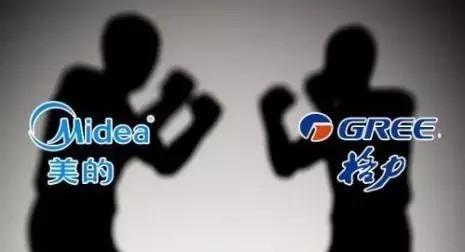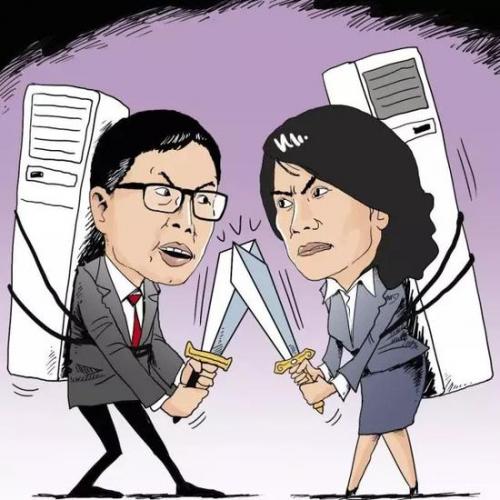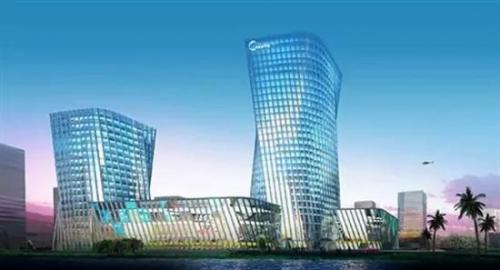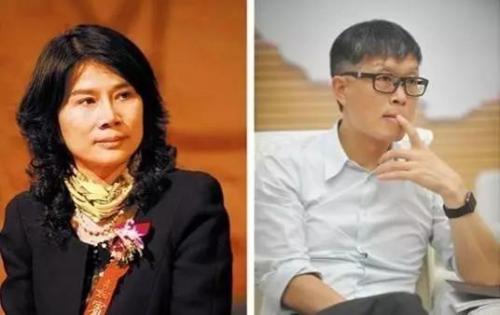OFweek smart home network news Gree and the United States of the "old family" and the war. In the short period of 10 days at the end of June, Gree filed four air-conditioning patent infringement lawsuits against each other, accumulating a total of nearly 100 million yuan in claims.
Gree and Midea, one of the state-owned enterprises with weaker state-owned asset management and control and small shareholders capable of "challenging" large shareholders, is one of the rare private enterprises that can establish a perfect professional manager system in China. Both of them have sold home appliances for many years, holding more than half of China's air-conditioning market share, and they are the duopoly of China's home appliance industry.
More than a decade ago, both teams defeated many opponents in the cruel market competition. In the past decade or so, along with the growth of the two companies, the disputes between them have never ceased.
Since Dong Mingzhu took control of Gree in 2012, she has always been directed against the United States. Today, the war between Gree and the United States is becoming increasingly fierce. I am afraid that it is not as simple as the patent litigation on the surface. The underlying reason behind this is that the pursuit of the United States has brought tremendous pressure on Gree.
"The grudge" has long been

As a matter of fact, as a pair of old friends, the contradiction between the United States and Gree can be described as a long-standing one. Since 2008, the two companies have been reconciled several times.
In 2008, Gree filed a lawsuit against Midea's “sleep comfort†function of air conditioners that infringed on “operating air conditioners and their control methods based on custom curvesâ€. The court decided that the United States would stop selling related products and compensate Gree with a loss of 2 million yuan.
In 2012, Gree filed a lawsuit against Midea for infringing its utility model patents for “installation of removable air conditioning indoor unit pipeline baffles.†The 2014 Guangdong Provincial High Court’s final judgment did not constitute infringement and rejected the appeal.
In 2013, Gree also sued Midea's “grain harvest†trademark infringement. In 2015, Gree finally won the case. The Guangdong Provincial High Court instructed Midea’s company to stop infringement and compensate Gree’s reasonable rights expenses, but the trial court ruled that the company’s company’s compensation for Gree’s economic losses. 3.8 million yuan, the fact that the facts are unclear, the application of legal errors, the high court to be corrected.
The competition between Gree and the United States is not limited to the infringement dispute. Outside the "See you at the court," both parties' remarks are also quite strong.
In early 2016, Gree and Midea both reported each other’s academic fraud. Gree claimed that the US won the second prize for national technological progress in 2014 for its energy-saving technology fraud, while the United States reported the fraud of Gree's inverter technology and both sued the other engineer for reputational infringement.
In addition, the high-level statements of the two sides are also arrogant.

Two years ago, Dong Mingzhu pointed to the U.S. to Gree secretly "digging people". On many occasions, the high-profile accusation against the United States was "thief" and he booed Xiaomi and Midea: "The two liar are together, and it is the thieves group." Earlier this year, Fang Hongbo countered Gree and said: "The 30 years without you feel bored." The contradictions between the two parties motivated and the hostility escalated.
There is also an ad that the United States has been advocating for "only one night for one night." Dong Mingzhu is also very annoyed. She has repeatedly shelled the air-conditioned advertising language in the public to deceive consumers. Despite the pressure from many parties, Midea changed its slogan to “a night of low powerâ€. However, Dong Mingzhu still remains in hot pursuit. In recent days, when Dong Mingzhu was attending Xinhuanet's “Skeele Lecture Roomâ€, he again publicly criticized the US propaganda language to deceive consumers and did not have good faith.
Behind the smell of gunpowder
With the domestic appliance giants, Gree and the United States have a long history of grievances, in recent years more frequent mutual enthusiasm, full of gunpowder flavor. Behind this is the constant shrinkage of the incremental space in the domestic air-conditioning market and the pursuit of Gree in the United States.
1. Market ceiling sparks white-hot competition
According to industry insiders, the reason why the competition between Gree Electric and Midea Group is so fierce is that the current air-conditioning market has reached the ceiling.
The data shows that in 2014, the retail scale of China's air-conditioning market was 157.5 billion yuan, an increase of only 0.6% from 2013. In 2015, the retail sales scale of China's air conditioner market did not increase, but it dropped by 4.8% to RMB 137.4 billion. Despite the very hot weather in 2016, the retail sales of air conditioners rose to RMB 160.6 billion. However, most people in the industry believe that the growth rate of the air-conditioning industry has reached the ceiling. Gree and Midea, the two giants in the domestic air-conditioning sector, must fight each other. Free.
2. Gree failed to diversify

Since January of this year, Gree's share price has continued to climb and its market value has exceeded 240 billion yuan. At the end of April, Gree Electric disclosed its 2016 annual report. The company's 2016 revenue was 108.3 billion yuan, up 10.8% year-on-year; its net profit was 15.4 billion yuan, up 23% year-on-year.
However, it is not hard to find that its revenue structure has never changed a lot. In 2013, revenue from air-conditioning accounted for 89% of Gree Electric Appliances. By 2016, air-conditioning revenue still accounted for 81% of Gree Electric Appliances. Compared with Dong Mingzhu’s claim that “My mobile phone is the first in the world†and the struggle to enter the field of new energy vehicles, Gree’s diversification strategy has not yet taken shape.
This means that air conditioning is still Gree's main source of profit. A company with a market value of 240 billion can't rely on a sunset industry to support the future. Gree knows this crisis. Dasong Life Electric was established in 2013, mainly promoting small home appliances, developing water heaters, water purifiers and other products, and later Gree mobile phones, today's new energy vehicles, Gree Electric also has been trying in other areas.
However, Gree's diversified products were unsuccessful, and Gree mobile phones were eventually seen as a farce. The investment in new energy vehicles cannot be seen as soon as the benefits. Dong Mingzhu’s anxieties can be imagined.
3. Gree air-conditioning field is quickly tied by the United States
Air conditioning is the only area Gree has advantages. However, the gap between the United States and Gree is very small, and the market is basically a duopoly. Data show that Gree Electric air-conditioning market share of about 29%, the United States and the Group is about 24%, the third Haier Group is only about 10%.
4. U.S. ice-washed small household appliances live in water

Gree puts all his net worth on air conditioners, but the US shows a typical multi-category situation. In terms of revenue composition in 2016, Gree Electric mainly derives its revenue from the air-conditioning business. The Group's main revenue comes from air-conditioning, small appliances, ice-washing and other businesses, of which sales of air-conditioning business is 66.8 billion yuan, accounting for 45.9 percent. %, other household appliances business accounted for 54.1%.
According to data from China Excel, Gree has the largest market share of air-conditioner products, while other products are performing generally. The U.S.-owned rice cookers, induction cookers, pressure cookers, and electric kettles accounted for the highest market share of retail sales, air-conditioners, washing machines, and microwave ovens ranked second, and refrigerators, water heaters, and smoking machines ranked third.
5. U.S. revenue, profit and market value surpass Gree
On April 28th, Midea and Gree released a quarterly report. Midea's revenue was 59.8 billion yuan, an increase of 56%; net profit attributable to the mother was 4.4 billion yuan, an increase of 11.4%. Gree revenue was 29.7 billion, an increase of 20.5%, and net profit was 4 billion, an increase of 27%. Whether it is revenue or net profit, the United States has surpassed Gree.
In 2017, based on the revenue of nearly 160 billion yuan in 2016, Midea’s revenue is expected to exceed 200 billion yuan, while Gree still can only fluctuate by 100 billion. In the recent five years, the Group’s revenue from the group has grown from 102.6 billion yuan to 160 billion yuan, with an average annual growth of 9%. Gree’s revenue during the same period reached 100 billion yuan, an average annual increase of 1.7%. In terms of overall performance, Gree has been surpassed by the United States.
Conclusion

It is not difficult to understand that Gree is hostile to the United States when it is approaching its own opponent in the field of air-conditioning, and an opponent who performs much better than himself in terms of diversity.
Not to mention that Dong Mingzhu is "beginning" at the United States. Before Dong Mingzhu was so anxious about the layout of mobile phones and new energy vehicles, we also saw Gree's position as the boss of the electrical appliance industry at stake. It was difficult to expand the market ahead of the market, and the United States then attacked the city.
As a domestic company, Geli & Midea, which has successfully grown into a globally competitive home appliance leader, has a very different development strategy. However, in terms of simplicity, it is mainly based on white electricity, in which Gree is known for its professionalism and the United States Diversification and internationalization are good at. However, after Gree and Midea had exceeded 100 billion yuan in revenue and profit exceeded 10 billion, no doubt they all saw the bottleneck of growth and began their own diversification.
Judging from the results achieved by the two companies today, on the road to diversification, the United States has taken a leading position in Gree's position.
The diversification of the United States has taken more of the international merger and acquisition model. Midea only made three overseas acquisitions in 2016. Not only for 27.2 billion yuan won the 94.55% shares of the German robot company KUKA, the United States also received about 3.32 billion yuan price, to get 80.1% of Toshiba's white-business shares. In addition, the United States also got an 80% stake in Italy's central air conditioning company Clivet that year.
In the past ten years, the reason why the United States has been able to pass over Gree's corner has been nothing more than one: Choosing a suitable track. In 2016, China's air conditioner industry experienced a negative growth of 7%. Where is the next pillar industry? Gree has not yet found its own runway. Gree’s strength lies in its specialization, brand focus and profitability. How to transform the brand in the new field expansion is a difficult problem for the future.
And beauty is not a matter of peace of mind. After becoming a large group spanning consumer electronics, HVAC, etc., how to maintain the competitiveness of its single category is also a lesson that the United States needs to do.
However, judging from the current situation, Miss Ging Dong has already shown sheer fatigue in this war between Gree and Midea. In addition to her ability to whisper, she has not taken any strategy to stop the US offensive.
Ring And Fork Type Insulated Terminals
Taixing Longyi Terminals Co.,Ltd. , https://www.lycopperterminals.com
